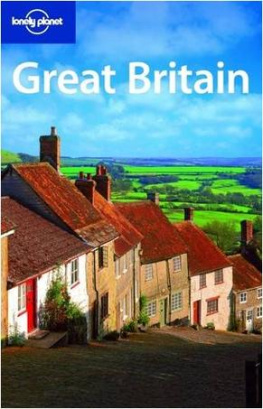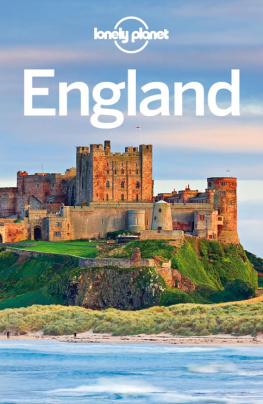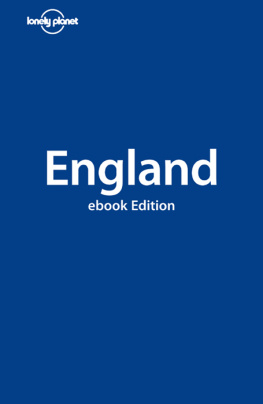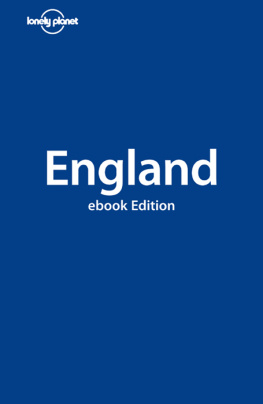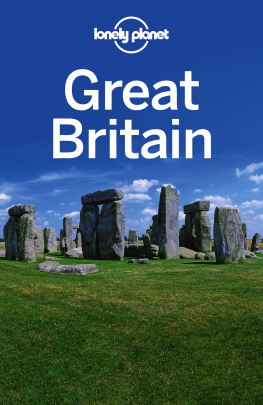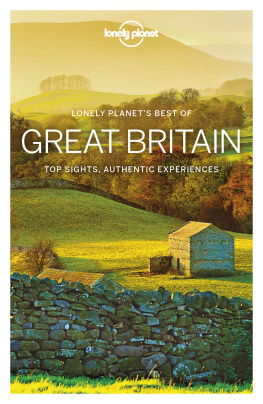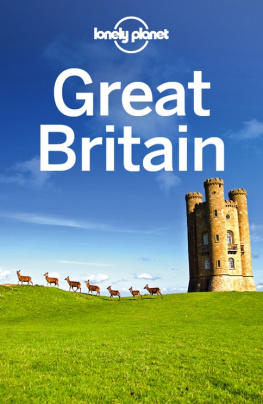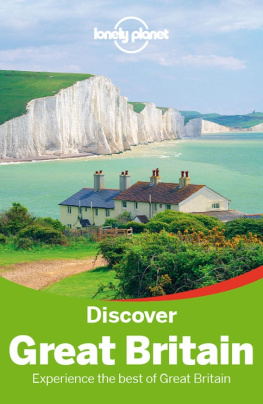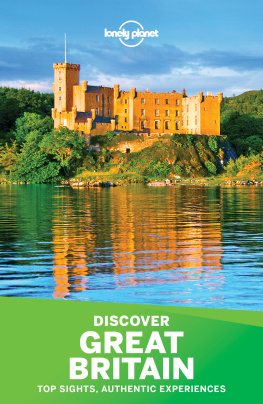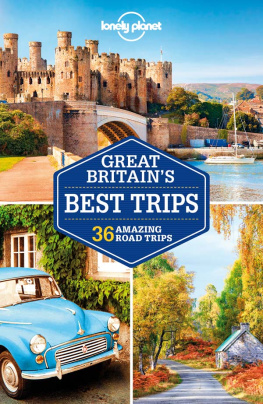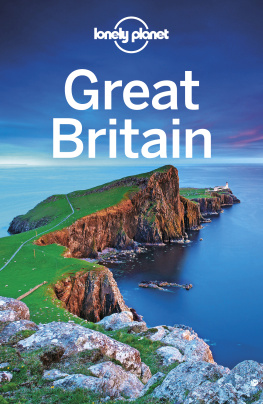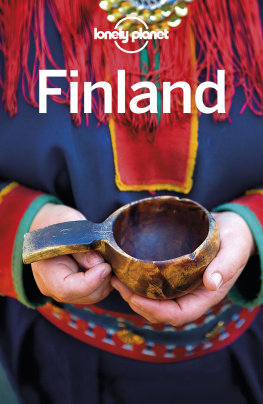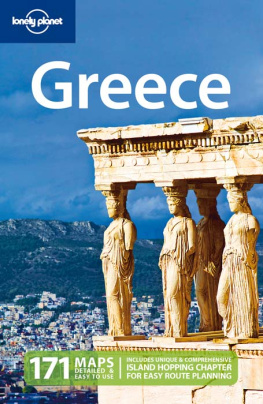David Else - Lonely Planet Great Britain (Country Guide)
Here you can read online David Else - Lonely Planet Great Britain (Country Guide) full text of the book (entire story) in english for free. Download pdf and epub, get meaning, cover and reviews about this ebook. year: 2009, publisher: Lonely Planet, genre: Non-fiction. Description of the work, (preface) as well as reviews are available. Best literature library LitArk.com created for fans of good reading and offers a wide selection of genres:
Romance novel
Science fiction
Adventure
Detective
Science
History
Home and family
Prose
Art
Politics
Computer
Non-fiction
Religion
Business
Children
Humor
Choose a favorite category and find really read worthwhile books. Enjoy immersion in the world of imagination, feel the emotions of the characters or learn something new for yourself, make an fascinating discovery.
- Book:Lonely Planet Great Britain (Country Guide)
- Author:
- Publisher:Lonely Planet
- Genre:
- Year:2009
- Rating:3 / 5
- Favourites:Add to favourites
- Your mark:
- 60
- 1
- 2
- 3
- 4
- 5
Lonely Planet Great Britain (Country Guide): summary, description and annotation
We offer to read an annotation, description, summary or preface (depends on what the author of the book "Lonely Planet Great Britain (Country Guide)" wrote himself). If you haven't found the necessary information about the book — write in the comments, we will try to find it.
Lonely Planet Great Britain (Country Guide) — read online for free the complete book (whole text) full work
Below is the text of the book, divided by pages. System saving the place of the last page read, allows you to conveniently read the book "Lonely Planet Great Britain (Country Guide)" online for free, without having to search again every time where you left off. Put a bookmark, and you can go to the page where you finished reading at any time.
Font size:
Interval:
Bookmark:
What is it that makes this damp little island moored off the northwest coast of Europe such a fascinating place to explore? For starters, Britain is a land for all seasons. Summer or winter, spring or autumn, theres always something to engage your imagination, be it the summer solstice at Stonehenge or the New Year street parties in Edinburgh.
There are over 5000 years of history to engage with, from the Stone Age village of Skara Brae to the space-age domes of the Eden Project, and from the stark simplicity of a Welsh chapel to the pomp and circumstance of Buckingham Palace. There are castles and cathedrals by the score, medieval monasteries and aristocratic mansions, and a roll-call of picturesque places with endearingly odd names, such as Lydiard Tregoze and Llanfairpwllgwyngyllgogerychwyrndrobwllllantysiliogogogoch.
Britain has given the world Shakespeare and soccer, the Beatles, James Bond, Monty Python and the programmable computer, not forgetting traffic lights, milky tea and the worlds least scary police. These cultural contributions are celebrated in a collection of fascinating museums and art galleries that range from world-class institutions like the Tate Britain and the Victoria & Albert Museum, to delightfully dotty local curiosities where else but Britain would you find the Pencil Museum and a dog-collar museum?
Then theres a geography textbooks worth of scenic landscapes, such as the rolling hop fields of Kent with their conical oast houses; the honeyed stone cottages and hedgerow-lined country lanes of the Cotswold hills; the soaring, silver-grey sea cliffs of Pembrokeshire, scabbed with yellow lichen; and the jagged, rock-girt peaks of the Isle of Skye.
Whatever the weather, theres a diverse menu of adventure activities to choose from, including some of Europes best surfing, scuba-diving, sailing and hiking; plus less-strenuous pastimes such as trainspotting at Yorks National Railway Museum and whale-watching off Scotlands west coast.
As you travel around the region, what are the issues of the day that youll hear Britons chatting about in the pub, at the bus stop and on the train? The national obsession with the weather has always seemed baffling to outsiders, who have often found it difficult to discern any difference between the mild winters and soggy summers. But in recent years the normally benign British weather has turned savage. Is it climate change in action? People are talking about an increase in summer storms and torrential downpours, and how 2007 saw the wettest summer, and 2008 the dullest August, since records began. There have been tornadoes in London and Birmingham, and many parts of the country, notably Yorkshire, Lincolnshire, Gloucestershire and south Wales, have suffered devastating flooding. Instead of looking forward to the summer sun, many now fear the summer floods.
Napoleon famously described Britain as a nation of shopkeepers, but today it has become a nation of homeowners. In the 1950s less than 40% of Britons owned their own homes; today the figure is more than 70%, and its the ambition of many to get a foot on the property ladder as soon as they can afford it. Wherever two or more Brits are gathered together, the conversation will soon turn to the subject of house prices. Encouraged by the belief that prices can only go up, by banks offering loans for 125% of a houses value, and by TV channels clogged with property porn, thousands of Britons have sunk their savings into bricks and mortar.
But at the time of going to press, Britain was under a cloud in more ways than one, with recession looming on the horizon. The global credit crunch that began in late 2007 has seen interest rates rise, mortgages dry up and house prices tumble possibly by as much as 30% by 2010. Those who bought into the get-rich-quick, property-owning dream in the last few years are feeling the clammy grip of negative equity, and tens of thousands of homes are being repossessed.
Population: 59 million
Area: 88,500 sq miles (230,000 sq km)
Inflation: 5.2% (October 2008)
Unemployment: 5.7% (August 2008)
Head of State: Queen Elizabeth II
Per capita GNP: approximately 23,500 (US$41,000)
Average annual rainfall in southeast England: 550mm
Average annual rainfall in northwest Highlands: 3000mm
Male life expectancy (posh part of Glasgow): 82
Male life expectancy (poor part of Glasgow): 54
The economic crisis has seen a backlash against the investment bankers, chief executives and hedge fund managers whose actions are seen by many as the cause of the credit crunch ordinary people suffer while the fat cats walk away with millions in their pockets. Financially speaking, Britain today is one of the most unequal societies in the developed world. Back in 1970 the average chief executive of a FTSE 100 company was paid around 10 times the earnings of the average employee; today that multiple is well over 100 times, and the wealthiest 10% of the population get 40% of the income. The popular mood is now in favour of increased regulation of the financial sector.
Britains unexpected success in the 2008 Olympics taking fourth place in the medal table with 19 gold (the Paralympic team came in second place overall, with 42 gold) prompted a surge of interest in cycling, rowing and sailing, and increased expectations for the London Olympics in 2012. The London Games will ensure the arrival of large numbers of overseas visitors (and their money), a raised profile for British tourism, new housing and sports facilities for the capital, plus increased fitness and improved health for the entire nation. Or so say supporters. Detractors claim that the billions of pounds being spent are unlikely to be recouped, and local groups protest that a nature reserve, garden allotments and even popular sports venues are being bulldozed to make way for the Olympic Park.
But before the Olympics take place, one of the governments most controversial policies will grind into action. In 2009 the government will begin issuing biometric ID cards to British citizens. Supporters claim the cards will help combat crime and illegal immigration, and will make it easier to prove your identity to banks, the police and government agencies. AntiID card campaigners say the policy is an infringement of personal privacy and civil liberties, and that the unified database underlying the scheme is an IT disaster waiting to happen. Whatever the outcome, Britain is already one of the most spied-upon societies in the world, with 4.2 million CCTV surveillance cameras about one for every 15 people. Something to think about as you travel around the country Big Brother is watching you!
Heres a handy slogan to remember while youre planning your trip: travel in Britain is a breeze. Granted, it may not be totally effortless, but its easy compared with many parts of the world. In this compact landscape youre never far from the next town, the next pub, the next national park or the next impressive castle on your hit list of highlights.
Any visitor to Britain will soon understand the locals obsession with the weather. Extremes of hot or cold are rare, but variability is a given. The key word is changeable: the weather can be bad one minute, great the next. It wouldnt be unusual in April, for example, for the morning to be warm enough for T-shirts, lunchtime to be cloudy, the afternoon see a downpour and drop in temperature, and the day polished off by an overnight dump of snow.
For more weather facts and figures, see Climate Charts, .
Despite apparent randomness, there is a seasonal pattern. Temperatures are higher in summer (June to August), and theres normally more sunshine, though July and August, along with the winter months, are often the rainiest months of the year. Conversely, winter (November to February) may enjoy fantastic clear spells between bouts of rain or snow, while spring (March to May) or autumn (September to October) can often produce the finest weather of the year. There are also northsouth variations: southern England might be chilly, while northern Scotland enjoys a heatwave. Or vice versa. Be prepared for anything and you wont get a surprise.
Font size:
Interval:
Bookmark:
Similar books «Lonely Planet Great Britain (Country Guide)»
Look at similar books to Lonely Planet Great Britain (Country Guide). We have selected literature similar in name and meaning in the hope of providing readers with more options to find new, interesting, not yet read works.
Discussion, reviews of the book Lonely Planet Great Britain (Country Guide) and just readers' own opinions. Leave your comments, write what you think about the work, its meaning or the main characters. Specify what exactly you liked and what you didn't like, and why you think so.

